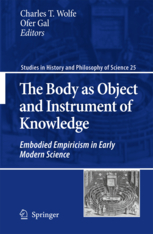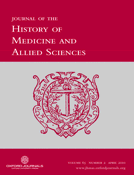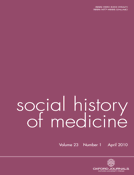Vous trouverez ci-joint le programme du Congrès des SHS en médecine 2010 qui se tiendra à Montpellier du 17 au 19 juin 2010. Le thème de cette édition est « La santé. Une question de justice »
You are currently browsing articles tagged Histoire.
Tags: Anthropologie, Histoire, Philosophie, Sociologie
APPEL À CONTRIBUTION
Mercredi 01 septembre 2010
Alphonse Bertillon et l’identification des personnes, 1880-1914
RÉSUMÉ
Bertillon et l’identification des personnes, 1880-1914 développe un travail pluridisciplinaire, collectif et international consacré à l’histoire de la police d’identification entre la fin du XIXe siècle et le début du XXe siècle. Centré sur la figure d’Alphonse Bertillon, ce projet propose une vue panoramique de son parcours, de son œuvre et des techniques innovantes d’identification auxquelles il contribua directement. Durant cette période charnière, un changement de régime modifie en profondeur les manières d’identifier les individus et l’identification devient une question centrale à tous les échelons de l’organisation des sociétés au sein desquelles les liens entre les instances de pouvoir et les administrés sont profondément renouvelés. Des questions posées depuis toujours – comment reconnaît-on une personne ? Comment définir son identité ? – accèdent au rang de problème politique de première importance et mobilisent des experts issus de multiples champs scientifiques.
Tags: Etudes des sciences, Histoire
Recrutement ATER en histoire des sciences à Lille 1
Un poste d’ATER (72e section) à temps complet apparaît dans
la campagne de recrutement à l’Université Lille 1 pour la rentrée 2010.
L’ensemble des modalités de dépôt des candidatures, le profil du poste et
l’accès à l’application de pré-inscription sont disponibles sur le site de
l’université, dans la rubrique « Lille 1 recrute » ou à l’adresse :
http://www.univ-lille1.fr/presentation/lille1-recrute/Recrutement-enseignants/Recrutement_ATER
Tags: Histoire
The Body as Object and Instrument of Knowledge, Embodied Empiricism in Early Modern Science, Studies in History and Philosophy of Science, Vol. 25
 Table of contents
Table of contents
1. Charles T. Wolfe and Ofer Gal, Embodied Empiricism
THE BODY AS OBJECT
2. Hal Cook, Victories for Empiricism, Failures for Theory: Medicine and Science in the Seventeenth Century
3. Cynthia Klestinec, Practical Experience In Anatomy
4. Alan Salter, Early Modern Empiricism and the Discourse of the Senses
5. Victor Boantza, Alkahest and Fire: Debating Matter, Chymistry, and Natural History at the Early Parisian Academy of Sciences
6. Peter Anstey, John Locke and Helmontian Medicine
THE BODY AS INSTRUMENT
7. Ofer Gal & Raz Chen-Morris, Empiricism Without The Senses: How the Instrument Replaced the Eye
8. Guido Giglioni, Mastering the Appetites of Matter. Francis Bacon’s Sylva Sylvarum
9. Justin E.H. Smith, ‘A Corporall Philosophy’: Language And ‘Body-Making’ In The Work Of John Bulwer (1606-1656)
10. Richard Yeo, Memory and Empirical Information: Samuel Hartlib, John Beale and Robert Boyle
11. Snait Gissis, Lamarck on Feelings: From Worms to Humans
EMBODIED MINDS
12. John Sutton, Carelessness and Inattention: Mind-Wandering and the Physiology of Fantasy From Locke to Hume
13. Lisa Shapiro, Instrumental or Immersed Experience: Pleasure, Pain and Object Perception in Locke
14. Anik Waldow, Empiricism and its Roots in the Ancient Medical Tradition
15. Tobias Cheung, Embodied Stimuli: Bonnet’s Statue of a Sensitive Agent
16. Charles T. Wolfe, Empiricist Heresies In Early Modern Medical Thought
Tags: Etudes des sciences, Histoire, Philosophie
Within the programme ‘Medicine of the Mind, Philosophy of the Body – Discourses of Health and Well-Being in the Ancient World’, funded by the Alexander von Humboldt Foundation and directed by Professor Philip van der Eijk, Alexander von Humboldt Professor of Classics and History of Science at the Humboldt University Berlin, a number of opportunities in the field of ancient medicine, philosophy and science are available:
2 « Mitarbeiterstellen »: research, teaching and outreach (fixed term until 31.12.2014, but with possibility of conversion into permanent positions)
3,5 « Mitarbeiterstellen »: research and outreach (fixed term for three years, but with possibility of extension)
2 Postdoctoral research fellowships (stipends for two years)
2 PhD stipends (three years)
For further information see http://www2.hu-berlin.de/klassphil/allgemein/jobsengl.htm
Tags: Etudes des sciences, Histoire, Philosophie
Parution de l’ouvrage Illness in context
 This book is a contribution to humanistic studies of illness. Medical humanities are by nature cross-disciplinary, and in recent years studies in this field have been recognized as a platform for dialogue between the “two cultures” of the natural sciences and the humanities. Illness in Context is a result of an encounter of several disciplines, including medicine, history and literature. The main stress is on the literary perspectives of the interdisciplinary collaboration. The reading practices highlighting the clinical, phenomenological and archeological approaches to illness take as their point of departure the living text, that is, the literary experience mediated and created by the text. Literature is seen not solely as a medium for the representation of experiences of illness, but also as a historical praxis involved in the forging of our common understanding of illness. In contrast to traditional literary analysis – primarily oriented toward the interpretation of the literary work’s meaning – the project will emphasize description and understanding of how literature itself performs as a means of interpretation of reality. The target group for this book comprises professionals in the various disciplines, and students of health and culture. The ambition is to contribute to teaching in humanistic illness research, and function as a topical resource book that formulates controversial problems in the crucial meeting of medicine and the humanities.
This book is a contribution to humanistic studies of illness. Medical humanities are by nature cross-disciplinary, and in recent years studies in this field have been recognized as a platform for dialogue between the “two cultures” of the natural sciences and the humanities. Illness in Context is a result of an encounter of several disciplines, including medicine, history and literature. The main stress is on the literary perspectives of the interdisciplinary collaboration. The reading practices highlighting the clinical, phenomenological and archeological approaches to illness take as their point of departure the living text, that is, the literary experience mediated and created by the text. Literature is seen not solely as a medium for the representation of experiences of illness, but also as a historical praxis involved in the forging of our common understanding of illness. In contrast to traditional literary analysis – primarily oriented toward the interpretation of the literary work’s meaning – the project will emphasize description and understanding of how literature itself performs as a means of interpretation of reality. The target group for this book comprises professionals in the various disciplines, and students of health and culture. The ambition is to contribute to teaching in humanistic illness research, and function as a topical resource book that formulates controversial problems in the crucial meeting of medicine and the humanities.
Contents
Knut Stene-Johansen and Frederik Tygstrup: Introduction: Illness in Context
Clinic
Deborah Kirklin: The Search for Meaning in Modern Medicine
Jan C. Frich: Dialogue and Creativity: Narrative in the Clinical Encounter
Drude von der Fehr: Clinical Tales and the Artlike Creativity of the Body
Vincent Colapietro: Signs of Illness
Phenomenology
Hélène Cixous: From The Day I Wasn’t There
Frederik Tygstrup: The Blue Chair. A Literary Report on Dementia in America
Gérard Danou: Henri Michaux in Search of his Tempo, or Great Health
Knut Stene-Johansen: Tolstoy and the Making of the Inhuman
Archeology
Anne Kveim Lie: Treatment Politics: The Rise of Radesyge Hospitals in Norway
Eric Hamraouï: Metaphors, Figures and Description in Sénac’s Traité de la structure du coeur, de son action et de ses maladies (1749)
Hilde Bondevik: Who’s Afraid of Amalie Skram? Hysteria and Rebellion in Amalie Skram’s Novels of Mental Hospitals
Mette Kia Krabbe Meyer: Like a high black wave. Jørgen Stein and the Spanish Flu
Johan Redin: Pathogenesis: Life, Literature and Animality. Medical Theory and Biological Nihilism in Eighteenth-Century Thought
Tags: Histoire, Littérature
APPEL A CONTRIBUTION
1ER MAI 2010, ARRAS (26-28 MAI 2011)
L’HERMAPHRODITE, DE LA RENAISSANCE AUX LUMIÈRES
« Textes et cultures », Université d’Artois
Date limite : 1 mai 2010
Bien que l’hermaphrodite ait été l’objet ces dernières années de nombreuses études, tant en France que dans le monde anglo-saxon, en particulier à travers le prisme des gender studies, il mérite qu’on y revienne. En effet, pour ce qui est de la période envisagée, les travaux de Kathleen P. Long pour la Renaissance, de Patrick Graille pour les XVIIe et XVIIIe siècles, et l’analyse de Pierre Ronzeaud sur l’utopie hermaphrodite, pour ne citer que les ouvrages les plus connus, invitent à poursuivre la réflexion sur une figure aussi complexe que contradictoire, notamment en ce qu’elle interroge les frontières entre le masculin et le féminin, la norme et le monstrueux, le mythe et la réalité, et se trouve à la croisée de nombreux discours, où se confrontent et s’interpénètrent le médical, le politique, le théologique et le littéraire, entre héritage antique et modernité.
Tags: Histoire
Parution Social history of medicine, Volume 23, Number 1, April 2010
Ezra Hasson, Capacity to Marry: Law, Medicine and Conceptions of Insanity
Shang-Jen Li, Discovering ‘The Secrets of Long and Healthy Life’: John Dudgeon on Chinese Hygiene
Melissa S. Dale, Understanding Emasculation: Western Medical Perspectives on Chinese Eunuchs
R. Danielle Egan and Gail Hawkes, Childhood Sexuality, Normalization and the Social Hygiene Movement in the Anglophone West, 1900–1935
Stephen Garton, Criminal Propensities: Psychiatry, Classification and Imprisonment in New York State 1916–1940
Nafsika Thalassis, Useless Soldiers: The Dilemma of Discharging Mentally Unfit Soldiers during the Second World War
Mical Raz, Psychosurgery, Industry and Personal Responsibility, 1940–1965
James Bennett, Keeping the Wolfenden from the Door? Homosexuality and the ‘Medical Model’ in New Zealand
John Abraham and Courtney Davis, Discovery and Management of Adverse Drug Reactions: The Nomifensine Hypersensitivity Syndrome, 1977–1986
Tags: Histoire
Parution Journal of the History of Medicine and Allied Sciences, Volume 65, N°2, Avril 2010

Tags: Etudes des sciences, Histoire
Prix de l’académie des sciences de Toulouse
L’Académie des sciences, inscriptions et belles lettres de Toulouse décerne, chaque année sous forme de médailles, diplômes et éventuellement dotations, des prix destinés à encourager de jeunes talents pour leurs ouvrages. De nombreux prix à caractère scientifique seront cette année encore remis par le jury de l’académie. Le dossier de candidature doit comporter en plus des coordonnées du candidat, un exemplaire des travaux et un bref résumé de ses titres et travaux.
Date limite : 1er mai 2010
Pour en savoir plus : AOacademie[1]
Tags: Etudes des sciences, Histoire

